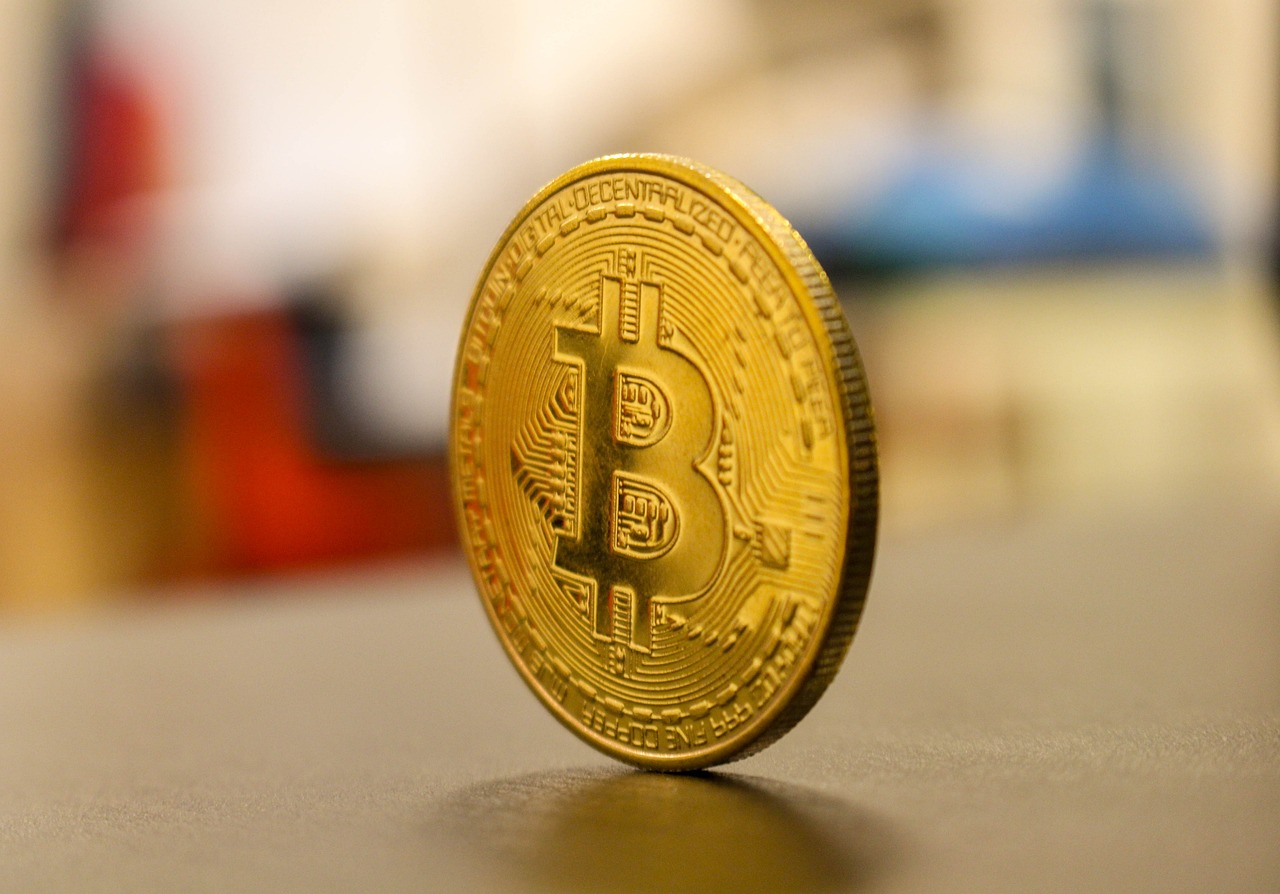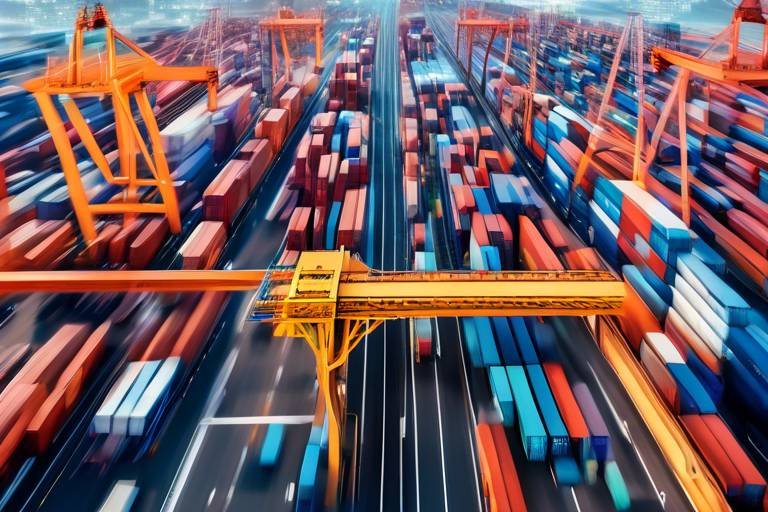Understanding Blockchain's Impact on Global Trade Relations
In today's fast-paced world, where every second counts and efficiency is paramount, blockchain technology is emerging as a game-changer in global trade. Imagine a world where transactions are not only faster but also more secure and transparent. That's the promise of blockchain—a decentralized ledger that records transactions across multiple computers, ensuring that the data is immutable and accessible in real-time. This revolutionary technology is reshaping how businesses interact, paving the way for a new era of trust and accountability in trade relations.
As we delve deeper into the intricacies of blockchain, it’s essential to understand its core principles. At its heart, blockchain operates on the idea of a distributed network, where every participant has access to the same information. This transparency eliminates the need for intermediaries, significantly reducing the chances of fraud and errors. But how does this translate into real-world benefits for global trade? Well, let’s explore the numerous advantages that blockchain brings to the table.
To grasp the full impact of blockchain on global trade, we must first understand its foundational elements. Blockchain is essentially a digital ledger that records transactions in a secure and tamper-proof manner. Each transaction is grouped into a block, which is then linked to the previous block, forming a chain. This structure not only enhances security but also allows for greater traceability of goods and services throughout the supply chain.
Moreover, blockchain operates on consensus mechanisms, which means that all participants in the network must agree on the validity of transactions before they are recorded. This consensus fosters a sense of trust among trading partners, as everyone involved has access to the same verified information. In a world where misinformation can lead to significant losses, this level of transparency is invaluable.
When it comes to global trade, the benefits of blockchain are numerous and impactful. Here are some key advantages:
- Improved Traceability: Blockchain allows for real-time tracking of products, enabling businesses to monitor their supply chains more effectively.
- Reduced Fraud: The immutable nature of blockchain significantly lowers the risk of fraudulent activities.
- Enhanced Efficiency: By automating processes and reducing paperwork, blockchain streamlines operations, leading to cost savings.
These benefits not only enhance operational efficiency but also foster greater trust among trading partners. When businesses can verify each step of a transaction, they are more likely to engage in long-term partnerships, ultimately boosting global trade relations.
One of the standout features of blockchain is its ability to provide real-time visibility into transactions. With an immutable ledger, stakeholders can track products and payments at every stage of the supply chain. This transparency fosters trust and accountability, as all parties can verify the authenticity of transactions without relying on third-party intermediaries.
Several industries have already begun to harness the power of blockchain to improve transparency. For instance, in the food industry, companies are using blockchain to track the journey of products from farm to table. This not only enhances consumer trust but also allows for quicker responses to food safety issues. Another example is in the diamond industry, where blockchain is being used to verify the ethical sourcing of diamonds, ensuring that consumers can make informed choices.
Despite its many advantages, blockchain is not without challenges. Data privacy concerns and the need for standardization across different platforms and jurisdictions can hinder the full realization of transparency. As businesses navigate these obstacles, it’s crucial to strike a balance between transparency and privacy, ensuring that sensitive information remains protected.
Blockchain technology plays a pivotal role in minimizing the risk of fraud and human error in trade transactions. By automating processes and employing cryptographic security measures, blockchain ensures data integrity. This level of security is particularly beneficial in sectors where the stakes are high, such as finance and healthcare, where a single error can lead to catastrophic consequences.
Another exciting aspect of blockchain is the introduction of smart contracts. These self-executing agreements automate trade processes, reducing the need for intermediaries and streamlining contract enforcement. Imagine a world where contracts execute automatically when conditions are met—this is not just a dream; it's the reality that smart contracts promise.
Smart contracts have a wide array of applications in global trade. They can be utilized in:
- Supply Chain Management: Automating processes to ensure timely deliveries and accurate tracking.
- Payment Processing: Facilitating instant payments upon contract fulfillment.
- Compliance Verification: Ensuring that all parties adhere to regulatory requirements without manual oversight.
As blockchain and smart contracts gain traction in international trade, legal and regulatory challenges must be addressed. The existing legal frameworks often struggle to keep pace with technological advancements, leading to uncertainty. It’s crucial for governments and regulatory bodies to update their frameworks to support innovation while ensuring consumer protection and compliance.
1. What is blockchain technology?
Blockchain is a decentralized digital ledger that records transactions across multiple computers, ensuring data security and transparency.
2. How does blockchain improve global trade?
Blockchain enhances global trade by providing improved traceability, reducing fraud, and increasing efficiency in transactions.
3. What are smart contracts?
Smart contracts are self-executing agreements on the blockchain that automate trade processes and reduce the need for intermediaries.
4. What challenges does blockchain face in trade?
Challenges include data privacy concerns, the need for standardization, and regulatory hurdles that can impede widespread adoption.

The Basics of Blockchain Technology
Blockchain technology is often described as a revolutionary force in the digital landscape, but what exactly does it entail? At its core, blockchain is a decentralized ledger that records transactions across multiple computers. This means that no single entity has control over the entire database, which enhances security and transparency. Imagine a public library where anyone can access the books, but no one can alter them without a consensus from the community. This analogy captures the essence of how blockchain operates.
Every transaction on a blockchain is grouped into a block, and these blocks are linked together in chronological order, forming a chain. This structure is what gives blockchain its name. Each block contains not only transaction data but also a unique cryptographic hash of the previous block, which ensures that any attempt to alter a block would require changes to all subsequent blocks—making fraud nearly impossible. In essence, blockchain functions as a digital fingerprint for each transaction, providing a high level of security.
One of the fundamental principles of blockchain is its transparency. Since the ledger is distributed across numerous nodes (or computers), every participant in the network can view the entire transaction history. This visibility fosters trust among parties engaged in trade, as everyone has access to the same information. However, while transparency is a significant advantage, it’s important to note that the level of visibility can vary. For instance, some blockchains are public, allowing anyone to see the transactions, while others are private, restricting access to specific users.
To better understand how blockchain works, let’s break down its key components:
- Nodes: These are individual computers that maintain a copy of the blockchain and validate transactions.
- Blocks: Each block contains a list of transactions, a timestamp, and a reference to the previous block.
- Consensus Mechanisms: These are protocols that ensure all nodes agree on the validity of transactions. Common methods include Proof of Work and Proof of Stake.
- Cryptography: This secures the data and ensures that transactions are tamper-proof.
Blockchain technology is not limited to cryptocurrencies; it has applications across various industries, including supply chain management, healthcare, finance, and even voting systems. Its potential to transform these sectors is immense, as it can enhance efficiency, reduce costs, and improve the overall integrity of transactions.
However, it’s essential to recognize that while blockchain offers many benefits, it is not without challenges. Issues such as scalability, energy consumption, and regulatory hurdles must be addressed to fully harness its potential. As the technology continues to evolve, ongoing research and innovation will play a crucial role in overcoming these obstacles and unlocking new opportunities for global trade.

Benefits of Blockchain in Trade
Blockchain technology is not just a buzzword; it's a revolutionary force reshaping global trade. By leveraging this innovative technology, businesses can unlock a treasure trove of benefits that enhance their operations and relationships with trading partners. One of the most significant advantages of blockchain is improved traceability. Imagine being able to track every step of a product's journey from the manufacturer to the consumer with absolute certainty. This level of visibility not only helps businesses streamline their supply chains but also builds trust among consumers who are increasingly concerned about the origins of their purchases.
Furthermore, blockchain significantly reduces fraud and errors in trade transactions. Traditional systems are often plagued by human mistakes and deceptive practices that can lead to financial losses and damaged reputations. With blockchain's cryptographic security measures, each transaction is recorded on an immutable ledger, making it nearly impossible for anyone to alter the data without detection. This level of security fosters a culture of accountability and integrity, allowing businesses to operate with confidence.
But that's not all! The efficiency gains provided by blockchain can lead to substantial cost savings. By automating processes and eliminating the need for intermediaries, companies can reduce transaction times and lower operational costs. For example, a traditional cross-border payment might take several days and incur hefty fees, while a blockchain-based transaction can be completed in a matter of minutes, often at a fraction of the cost.
Moreover, the enhanced transparency offered by blockchain allows stakeholders to have real-time access to transaction data. This transparency is a game-changer, as it enables all parties involved to verify and validate transactions without relying on a central authority. As a result, businesses can foster stronger relationships with their partners, as trust is built on the foundation of verifiable data. In sectors like food and pharmaceuticals, where safety and compliance are paramount, this transparency can be a lifesaver, ensuring that products meet the necessary standards and regulations.
In summary, the benefits of blockchain in trade are multifaceted and profound. From improved traceability and reduced fraud to enhanced efficiency and transparency, this technology is paving the way for a more secure and trustworthy trading environment. As businesses continue to explore the potential of blockchain, they are not only improving their operations but also contributing to a more robust global trade ecosystem.
- What is blockchain technology? Blockchain is a decentralized digital ledger that records transactions across many computers in a way that the registered transactions cannot be altered retroactively.
- How does blockchain improve traceability in trade? Blockchain allows for real-time tracking of products through a transparent and immutable ledger, ensuring that all stakeholders can verify the journey of a product.
- Can blockchain reduce transaction costs? Yes, by automating processes and eliminating the need for intermediaries, blockchain can significantly lower transaction costs and improve efficiency.
- What industries can benefit from blockchain? While blockchain is most commonly associated with finance, it has applications across various sectors, including supply chain management, healthcare, and agriculture.

Enhanced Transparency
In the ever-evolving landscape of global trade, transparency has emerged as a critical factor for fostering trust and accountability among stakeholders. Blockchain technology, with its unique characteristics, offers a revolutionary approach to achieving this transparency. Imagine a system where every transaction is recorded in an immutable ledger that is accessible to all parties involved. This is precisely what blockchain delivers, transforming the way businesses interact with each other and enhancing the overall integrity of the supply chain.
One of the standout features of blockchain is its ability to provide real-time visibility into transactions. Each entry in the blockchain is time-stamped and linked to the previous one, creating a chronological chain of events that can be traced back to the origin of the product. This means that whether you’re a manufacturer, supplier, or consumer, you can track the journey of a product from its inception to its final destination. For instance, if you’re purchasing a luxury handbag, blockchain allows you to verify its authenticity by tracing its production history, ensuring that you’re not falling victim to counterfeit goods.
Furthermore, the decentralized nature of blockchain means that no single entity has control over the entire network. This democratization of data reduces the risk of manipulation and fosters a culture of collaboration among trading partners. Everyone has access to the same information, which minimizes disputes and enhances the efficiency of transaction processes. As a result, businesses can focus on building relationships rather than worrying about potential fraud or misinformation.
To illustrate the impact of enhanced transparency through blockchain, consider the following case studies:
| Industry | Implementation | Outcome |
|---|---|---|
| Food Supply Chain | Walmart's use of blockchain to trace the origin of produce | Reduced time to trace food sources from 7 days to 2.2 seconds |
| Pharmaceuticals | Modum's solution for tracking drug shipments | Improved compliance and reduced counterfeit drugs in the market |
These examples showcase how blockchain has successfully improved transparency in trade, leading to significant operational efficiencies and increased consumer trust. However, while the benefits are compelling, it’s essential to acknowledge the challenges that can hinder transparency in blockchain systems. Issues such as data privacy concerns and the need for standardization across different platforms and jurisdictions can pose significant obstacles. As businesses navigate these challenges, the focus must remain on developing solutions that prioritize transparency while safeguarding sensitive information.
In conclusion, enhanced transparency through blockchain technology is not just a buzzword; it’s a transformative force that is reshaping global trade. By providing a clear view of transactions and fostering trust among stakeholders, blockchain is paving the way for a more efficient and reliable trading environment.
- What is blockchain technology? Blockchain is a decentralized digital ledger that records transactions across multiple computers, ensuring that the recorded information cannot be altered retroactively.
- How does blockchain enhance transparency? Blockchain enhances transparency by providing an immutable record of transactions that is accessible to all parties involved, allowing for real-time tracking and verification.
- What are the challenges to achieving transparency with blockchain? Challenges include data privacy concerns, the need for standardization, and the integration of blockchain with existing systems.

Case Studies of Transparency
When we talk about the transformative power of blockchain technology, it’s essential to look at real-world examples that illustrate its impact on transparency in global trade. One of the most striking cases comes from the food supply chain, where companies like Walmart have implemented blockchain solutions to track the journey of food products from farm to table. By using a blockchain-based system, Walmart can trace the origin of its products in mere seconds, a process that previously took days or even weeks. This not only enhances consumer trust but also allows for swift action in the event of a food safety issue, significantly reducing the risk of widespread contamination.
Another compelling example is the partnership between IBM and Maersk, which launched a blockchain-based shipping platform called TradeLens. This platform enables all participants in the shipping industry, from port operators to customs authorities, to access a shared ledger that records every transaction related to shipping containers. The result? A dramatic increase in visibility and accountability. Stakeholders can track shipments in real-time, reducing delays and ensuring that all parties are informed of the status of goods in transit. The success of TradeLens has led to increased collaboration within the industry, showcasing how transparency can lead to improved efficiency.
In the luxury goods sector, Everledger has developed a blockchain solution to combat the issue of counterfeit diamonds. By creating a digital ledger that records the provenance of each diamond—from its mine of origin to its final sale—Everledger has made it possible for consumers to verify the authenticity of their purchases. This initiative not only enhances transparency but also builds trust between consumers and retailers, as buyers can be confident that they are purchasing genuine products.
However, it's crucial to recognize that while these case studies highlight the benefits of transparency through blockchain, they also come with lessons learned. For instance, the implementation of such technologies requires a significant investment in infrastructure and training. Furthermore, achieving widespread adoption necessitates collaboration among various stakeholders, which can be challenging due to differing interests and existing systems.
In summary, these case studies illustrate the potential of blockchain to enhance transparency in global trade. They demonstrate that by providing a clear and immutable record of transactions, businesses can not only improve their operations but also foster trust among consumers and partners alike. As more companies recognize the advantages of blockchain, we can expect to see an increase in transparency across various industries, paving the way for a more accountable and efficient global trade environment.
- What is blockchain technology?
Blockchain is a decentralized digital ledger that securely records transactions across multiple computers, making it nearly impossible to alter or hack the data. - How does blockchain enhance transparency?
By providing an immutable record of transactions, all stakeholders can view the same information in real-time, which fosters trust and accountability. - What are smart contracts?
Smart contracts are self-executing contracts with the terms directly written into code, allowing for automated and secure execution of agreements without intermediaries. - What challenges does blockchain face in global trade?
Challenges include data privacy concerns, the need for standardization, and the legal implications surrounding the use of blockchain and smart contracts.

Challenges to Transparency
While blockchain technology holds immense potential for enhancing transparency in global trade, it is not without its challenges. One of the most significant hurdles is data privacy concerns. In a world where information is power, businesses often hesitate to share sensitive data on a public ledger. Imagine a retailer revealing their entire supply chain process to competitors! This fear can lead to reluctance in adopting blockchain solutions, as companies strive to protect their proprietary information.
Another challenge lies in the need for standardization. Currently, various blockchain platforms operate independently, each with its own protocols and practices. This fragmentation can create barriers to interoperability, making it difficult for different systems to communicate and collaborate effectively. For instance, if one company uses a blockchain that does not align with its trading partner’s system, the benefits of transparency can be severely undermined. Thus, establishing universal standards is crucial for broader adoption.
Additionally, the regulatory landscape poses a significant challenge. Governments around the world are still grappling with how to regulate blockchain technology. Without clear guidelines, businesses may be hesitant to invest in blockchain solutions, fearing potential legal repercussions. Moreover, the lack of regulatory clarity can lead to inconsistent practices, further complicating the transparency landscape.
Lastly, there is the issue of user education. Many stakeholders in global trade may not fully understand how blockchain works or its benefits. This lack of knowledge can lead to skepticism and resistance to change. To overcome this, it is essential to provide comprehensive training and resources to help businesses grasp the transformative potential of blockchain technology.
In summary, while the promise of blockchain in enhancing transparency is exciting, it is crucial to address these challenges head-on. By tackling data privacy concerns, establishing standards, navigating regulatory complexities, and educating users, we can unlock the full potential of blockchain technology in global trade.
- What is blockchain technology? Blockchain is a decentralized digital ledger that securely records transactions across multiple computers, ensuring that the data cannot be altered retroactively.
- How does blockchain enhance transparency in trade? Blockchain provides an immutable record of transactions that can be accessed in real-time by all stakeholders, fostering trust and accountability.
- What are smart contracts? Smart contracts are self-executing contracts with the terms of the agreement directly written into code, automating processes and reducing the need for intermediaries.
- What challenges does blockchain face in global trade? Challenges include data privacy concerns, the need for standardization, regulatory uncertainties, and user education.

Reducing Fraud and Errors
In a world where every transaction is meticulously scrutinized, the potential for fraud and human error is a constant concern, especially in global trade. Blockchain technology emerges as a beacon of hope, offering a robust solution to these age-old problems. By leveraging its decentralized nature and cryptographic security, blockchain significantly minimizes the risks associated with fraudulent activities and inaccuracies in record-keeping.
Imagine a scenario where every transaction is recorded on a public ledger that is immutable—meaning once something is recorded, it cannot be altered or deleted. This characteristic of blockchain not only provides a sense of security but also fosters an environment where trust can flourish among trading partners. With traditional systems, a simple error can lead to catastrophic consequences, like financial losses or damaged reputations. Blockchain mitigates this risk by ensuring that all parties have access to the same information, thereby eliminating discrepancies and the potential for miscommunication.
Moreover, the automation of processes through smart contracts further reduces the likelihood of human error. These self-executing contracts automatically enforce the terms agreed upon by both parties without the need for intermediaries. For instance, when goods are shipped, a smart contract can automatically release payment once the delivery is confirmed, reducing the chances of payment disputes and ensuring that all parties adhere to the agreed terms.
To illustrate the impact of blockchain on reducing fraud and errors, consider the following table that outlines the traditional challenges faced in global trade versus the solutions provided by blockchain:
| Traditional Challenges | Blockchain Solutions |
|---|---|
| Inconsistent record-keeping | Immutable and transparent ledger |
| High susceptibility to fraud | Cryptographic security measures |
| Dependency on intermediaries | Smart contracts automate processes |
| Delayed reconciliation | Real-time transaction visibility |
In essence, blockchain serves as a digital fortress, safeguarding transactions from the threats of fraud and error. The transparency it offers ensures that all stakeholders can verify and validate every transaction, creating a culture of accountability. This newfound trust not only enhances operational efficiency but also paves the way for more collaborative relationships between businesses, ultimately transforming the landscape of global trade.
- What is blockchain technology? Blockchain is a decentralized digital ledger that records transactions across multiple computers in a way that the registered transactions cannot be altered retroactively.
- How does blockchain reduce fraud? By providing an immutable record of transactions and using cryptographic security, blockchain makes it extremely difficult for fraudulent activities to occur.
- What are smart contracts? Smart contracts are self-executing contracts with the terms of the agreement directly written into code, allowing for automated processes without intermediaries.
- Can blockchain be used in any industry? Yes, blockchain technology has applications across various industries, including finance, supply chain, healthcare, and more.

Smart Contracts and Their Role
In the rapidly evolving landscape of global trade, smart contracts are emerging as a game-changing innovation that is reshaping how transactions are conducted. Imagine a world where agreements are executed automatically, without the need for intermediaries or lengthy negotiations. This is precisely what smart contracts offer—a self-executing code that runs on the blockchain, ensuring that all parties involved adhere to the terms of the agreement in real-time. But how do these digital contracts work, and what are their implications for international trade?
At their core, smart contracts are programs stored on a blockchain that automatically enforce and execute the terms of a contract when predetermined conditions are met. This means that once the contract is deployed, it operates independently, eliminating the potential for human error or manipulation. For instance, in the context of a supply chain transaction, a smart contract could be programmed to release payment to a supplier only after the goods have been delivered and verified. This automation not only speeds up the process but also enhances trust among trading partners, as all actions are recorded transparently on the blockchain.
One of the most exciting aspects of smart contracts is their versatility. They can be applied across various sectors, providing solutions that were previously unimaginable. Here are a few notable applications:
- Supply Chain Management: Smart contracts can automate the entire supply chain process, tracking products from origin to destination, ensuring compliance with regulations, and triggering payments upon delivery.
- Payment Processing: By integrating with digital currencies, smart contracts can facilitate instant payments, reducing the time and costs associated with traditional banking systems.
- Compliance Verification: Smart contracts can ensure that all parties meet regulatory requirements by automatically checking compliance before executing any transactions.
However, the implementation of smart contracts is not without challenges. Legal and regulatory considerations are paramount. Different jurisdictions have varying laws regarding the validity and enforceability of digital contracts. As such, there is a pressing need for governments and regulatory bodies to develop frameworks that support the use of smart contracts in international trade. This will not only pave the way for broader adoption but also provide a safety net for businesses operating in a digital landscape.
Moreover, the technology itself must evolve to address concerns related to security and scalability. While blockchain offers enhanced security features, the potential for vulnerabilities remains a concern. Businesses must ensure that their smart contracts are coded accurately and are resistant to hacking attempts. Furthermore, as the volume of transactions increases, scalability will become a critical factor in determining the effectiveness of smart contracts in high-demand environments.
In conclusion, smart contracts hold immense potential to revolutionize global trade by streamlining processes, reducing costs, and enhancing trust among trading partners. As we continue to explore the possibilities of blockchain technology, it is crucial for stakeholders to collaborate and address the legal and technical challenges that stand in the way of widespread adoption. The future of trade is not just about transactions; it’s about creating a more efficient, transparent, and secure system for all.
- What are smart contracts? Smart contracts are self-executing contracts with the terms of the agreement directly written into code, running on a blockchain.
- How do smart contracts enhance trade? They automate processes, reduce the need for intermediaries, and ensure compliance, leading to faster and more secure transactions.
- What challenges do smart contracts face? Legal and regulatory issues, security vulnerabilities, and scalability concerns are significant challenges to widespread adoption.
- Can smart contracts be used in any industry? Yes, smart contracts can be applied across various sectors, including finance, supply chain, and real estate, among others.

Applications of Smart Contracts
Smart contracts are revolutionizing the way businesses engage in global trade by automating processes and minimizing the need for intermediaries. Think of them as digital vending machines: once you input the right amount of money (or data), the machine automatically delivers your snack (or service) without the need for a cashier. This automation not only speeds up transactions but also reduces the chances of human error, ensuring that agreements are executed exactly as intended.
One of the most significant applications of smart contracts is in supply chain management. By utilizing smart contracts, companies can automate the tracking of goods from the manufacturer to the end consumer. For instance, when a shipment is dispatched, a smart contract can automatically trigger payments to the supplier once the goods are confirmed as delivered. This seamless integration enhances efficiency and ensures that all parties are held accountable, as the terms of the contract are coded directly into the blockchain.
Additionally, smart contracts play a crucial role in payment processing. In traditional trade, payments can take days or even weeks to settle, leading to cash flow issues for businesses. With smart contracts, payments can be executed instantly upon the fulfillment of contract terms. For example, if a buyer receives their goods and confirms their condition via a digital signature, the smart contract can automatically release the funds to the seller, eliminating delays and enhancing trust between parties.
Compliance verification is another area where smart contracts shine. In international trade, businesses must adhere to various regulations and standards. Smart contracts can be programmed to automatically verify compliance with these regulations before a transaction is executed. This not only simplifies the auditing process but also reduces the risk of penalties due to non-compliance, making it easier for businesses to navigate complex legal landscapes.
Let's take a closer look at some specific applications of smart contracts in global trade:
| Application | Description | Benefits |
|---|---|---|
| Supply Chain Management | Automates tracking and payment processes. | Increased efficiency and accountability. |
| Payment Processing | Instant payments upon fulfillment of contract terms. | Improved cash flow and reduced transaction times. |
| Compliance Verification | Ensures adherence to regulations before executing transactions. | Reduced risk of penalties and simplified audits. |
In summary, the applications of smart contracts in global trade are vast and transformative. By automating essential processes, enhancing efficiency, and ensuring compliance, smart contracts are not just a trend; they are a fundamental shift in how trade can be conducted. As businesses continue to adopt this technology, we can expect to see a more streamlined and trustworthy trading environment that benefits all stakeholders involved.
- What is a smart contract? A smart contract is a self-executing contract with the terms of the agreement directly written into code on the blockchain.
- How do smart contracts enhance trade? They automate processes, reduce the need for intermediaries, and ensure that transactions are executed accurately and efficiently.
- Are smart contracts legally binding? Yes, but their legal status can vary by jurisdiction, and businesses should consult legal experts when implementing them.
- What industries can benefit from smart contracts? Many industries, including supply chain, finance, real estate, and healthcare, can leverage smart contracts for increased efficiency and transparency.

Legal and Regulatory Considerations
As blockchain technology continues to gain traction in global trade, it brings with it a host of legal and regulatory challenges that must be addressed. One of the primary concerns is the lack of a unified regulatory framework across different countries. Each nation has its own laws governing trade, data privacy, and digital currencies, which can create confusion and hinder the seamless adoption of blockchain. Imagine trying to navigate a maze where each turn leads to a different set of rules; that’s what businesses face when engaging in international trade using blockchain.
Moreover, the anonymity and decentralization inherent in blockchain can conflict with existing regulations designed to ensure compliance and accountability. For instance, anti-money laundering (AML) and know your customer (KYC) regulations require businesses to identify their clients and monitor transactions for suspicious activity. However, the pseudonymous nature of blockchain transactions could make it challenging to fulfill these obligations.
Another significant concern is the legal status of smart contracts. While smart contracts automate and enforce agreements, their legal recognition varies from one jurisdiction to another. Some countries have embraced them, offering legal frameworks that validate smart contracts, while others have yet to establish clear guidelines. This disparity can lead to disputes about the enforceability of these contracts, especially when parties are located in different legal territories. To illustrate this point, consider the following table:
| Country | Smart Contract Legislation |
|---|---|
| United States | Recognizes smart contracts under the Uniform Electronic Transactions Act (UETA) |
| European Union | Working on regulations to support blockchain and smart contracts |
| China | Has implemented blockchain technology but lacks clear smart contract regulations |
| United Kingdom | Smart contracts are legally recognized, but still face regulatory hurdles |
In addition to these challenges, the issue of data privacy cannot be overlooked. Blockchain's transparency is often touted as one of its greatest strengths; however, it can also expose sensitive business information. The General Data Protection Regulation (GDPR) in the European Union, for instance, imposes strict rules on data handling and the right to be forgotten. This creates a dilemma for businesses that want to leverage blockchain's benefits while complying with privacy regulations.
To navigate these complex legal waters, businesses must stay informed about the evolving regulatory landscape and consider engaging with policymakers to advocate for frameworks that support blockchain innovation. Additionally, seeking legal counsel with expertise in both blockchain technology and international trade law can be invaluable in ensuring compliance and mitigating risks.
In summary, while blockchain holds immense potential to revolutionize global trade, its adoption is not without challenges. By addressing legal and regulatory considerations proactively, businesses can position themselves to harness the full benefits of this transformative technology.
- What are the main legal challenges associated with blockchain technology?
The primary challenges include a lack of unified regulatory frameworks, the legal status of smart contracts, and data privacy concerns. - How do different countries regulate smart contracts?
Regulations vary significantly, with some countries recognizing smart contracts while others do not have clear legal guidelines. - What should businesses do to ensure compliance with blockchain regulations?
Businesses should stay informed about regulatory changes, engage with policymakers, and seek legal advice from experts in blockchain and trade law.
Frequently Asked Questions
- What is blockchain technology?
Blockchain technology is a decentralized digital ledger that records transactions across multiple computers. This ensures that the recorded transactions cannot be altered retroactively, providing a secure and transparent method for managing data.
- How does blockchain enhance global trade?
Blockchain enhances global trade by improving transparency, reducing fraud, and increasing efficiency. It allows all parties involved in a transaction to access the same information in real-time, which builds trust and reduces the chances of disputes.
- What are smart contracts?
Smart contracts are self-executing contracts with the terms of the agreement directly written into code. They automatically enforce and execute contractual obligations when predetermined conditions are met, eliminating the need for intermediaries.
- Can blockchain reduce fraud in trade?
Yes, blockchain can significantly reduce fraud in trade by providing a secure and immutable record of transactions. With cryptographic security measures, it minimizes the risk of unauthorized changes and enhances data integrity.
- What are the challenges of implementing blockchain in trade?
Some challenges include data privacy concerns, the need for standardization across various platforms, and regulatory hurdles. These obstacles can hinder the widespread adoption of blockchain technology in global trade.
- How does transparency in blockchain work?
Transparency in blockchain works through its immutable ledger, which allows all stakeholders to view and verify transactions in real-time. This visibility fosters trust and accountability among trading partners.
- What industries can benefit from blockchain technology?
Many industries can benefit from blockchain technology, including supply chain management, finance, healthcare, and logistics. Each of these sectors can leverage blockchain for enhanced security, efficiency, and transparency.
- What are the legal implications of using blockchain?
The legal implications of using blockchain involve issues related to contract enforcement, jurisdiction, and regulatory compliance. As blockchain technology evolves, existing legal frameworks may need to be updated to accommodate these innovations.



















